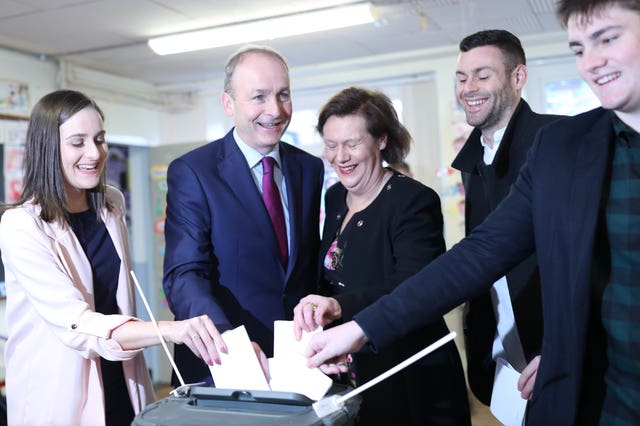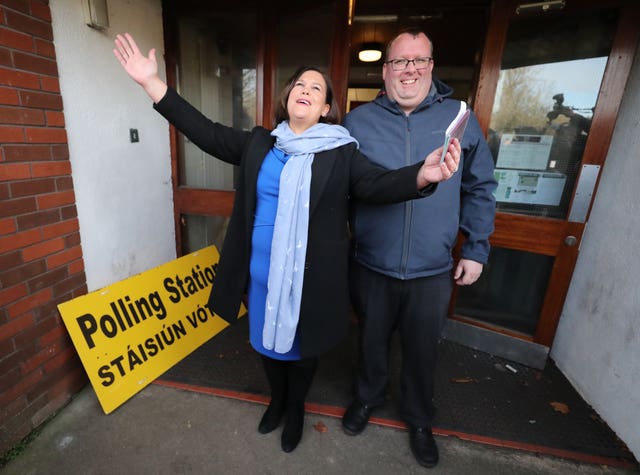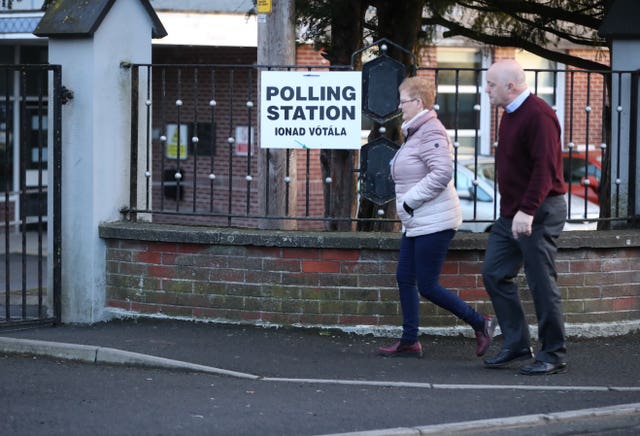
Ireland’s President and the main political leaders have cast their votes in one of the most unpredictable General Elections for years.
The country is having its first Saturday parliamentary poll in more than a century.
The voting pattern is unlikely to follow the flow of a week-day election, making turn out harder to assess.
There were conflicting reports by early Saturday evening, with many areas reporting a brisk voting pace through the day – but Taoiseach Leo Varadkar claiming the numbers going to the polls were actually low.
Sinn Fein could be poised to challenge the 90-year duopoly of the state’s two main parties, Fianna Fail and Fine Gael, and the process of forming a coalition Government could be challenging, opinion polls suggest.
President Michael D Higgins was accompanied by his wife Sabina at a Dublin polling station.
Micheal Martin, the leader of main opposition party Fianna Fail, voted with his wife, daughter and two sons early on Saturday morning in Co Cork in the south.
Fine Gael leader Mr Varadkar is facing a difficult battle to hang on to power – recent polls put his party behind Fianna Fail and Sinn Fein.
He brought a box of Roses sweets for count staff at his polling station in west Dublin.
Sinn Fein leader Mary Lou McDonald also cast her vote in the capital on an “important” day.
She said: “Today is the day that people are in charge and every single vote counts.
“People have told us throughout this campaign that they want change, that they want a change in our presentation and they want a change in government, so I am saying to people please come out today and vote for a change.
“Bring your family, your neighbours and friends and come down and use your vote – today is your day.”

In Co Wicklow, south of Dublin, average turnout by Saturday afternoon had reached just over 30%, an electoral official said.
Poor weather conditions caused by Storm Ciara and the Ireland rugby international were among other factors that could influence voters’ decisions on whether to enter the booths.
In the last major survey of the electorate before polling day, Sinn Fein was leading the popularity stakes on 25%, with Fianna Fail second on 23% and Mr Varadkar’s party on 20%.
If those levels of support are borne out when counting begins on Sunday, it would herald a major breakthrough for Sinn Fein south of the border.
The odds would still be stacked against Ms McDonald leading the next government as Taoiseach since Sinn Fein only fielded 42 candidates in the race for the Dail parliament’s 160 seats.

No party is expected to reach the 80-seat threshold to enable it to govern on its own, and a coalition administration of some complexion is almost inevitable.
Sinn Fein may be unable to find enough like-minded left-leaning allies to form a workable government.
Fianna Fail and Fine Gael are both centre-right in outlook and appeal to middle Ireland so have unequivocally ruled out any partnership with Sinn Fein.
For either to change position on coalition partners would represent a major U-turn.
If that case Sinn Fein would be unlikely to secure a place in the next government.

Fianna Fail topped the opinion polls early in the campaign, and leader Mr Martin could yet emerge as the next Taoiseach.
Mr Varadkar, meanwhile, will be hoping his administration’s economic record and handling of the Brexit process will convince enough voters to renew his tenure in Government Buildings.
Brexit did not feature prominently in a campaign dominated by domestic issues like spiralling rental prices, record-breaking homeless numbers, controversy over the state pension age and a struggling health service.
There appears to be a mood for change and Sinn Fein could attract support from younger voters who want to end Fine Gael’s nine years in power but are unwilling to trust Fianna Fail again after the financial crash that tarnished its last term of office.


Comments: Our rules
We want our comments to be a lively and valuable part of our community - a place where readers can debate and engage with the most important local issues. The ability to comment on our stories is a privilege, not a right, however, and that privilege may be withdrawn if it is abused or misused.
Please report any comments that break our rules.
Read the rules here